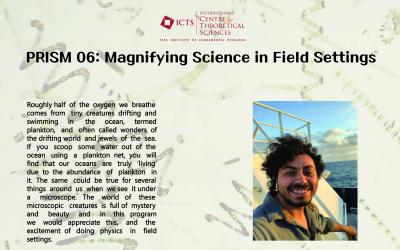Program Description
Roughly half of the oxygen we breathe comes from tiny creatures drifting and swimming in the ocean, termed plankton, and often called wonders of the drifting world and jewels of the sea . If you scoop some water out of the ocean using a plankton net, you will find that our oceans are truly ‘living’ due to the abundance of plankton in it. The same could be true for several things around us when we see it under a microscope. The world of these microscopic creatures is full of mystery and beauty and in this session we would appreciate this, and the excitement of doing physics in field settings.
The activity will have three components:
-
Observation: Learning to independently observe small things using microscopes.
- Art: Converting observation into drawings.
-
Expedition: Exploring the ICTS campus at microscopic scales and asking scientific questions.
Eligibility
Open to school students from grade 7th to 10th in Bengaluru. Please register using the registration link below, for group participation write to 'outreach@icts.res.in'. Participation is by invitation only.
About the Speaker
Rahul Chajwa, received his PhD in Physics at the International Center for Theoretical Sciences, where he worked with Rama Govindarajan, Sriram Ramaswamy and Narayanan Menon on experimental and theoretical aspects of Driven Stokesian Suspensions. His PhD work was conferred Geeta Udgaonkar Best Thesis Award in Physics 2021. He is currently a HFSP Cross-Disciplinary Postdoctoral Fellow at Stanford University, working with Manu Prakash on marine snow in the open oceans. Chajwa's research lies at the intersection of soft matter physics and climate change. He does table-top experiments (on land and sea) and theory to seek fundamental principles underlying the dynamics of the Biological Pump in our oceans, which is central to the ongoing climate change.
Supported by: Arista Networks India Pvt. Ltd.


